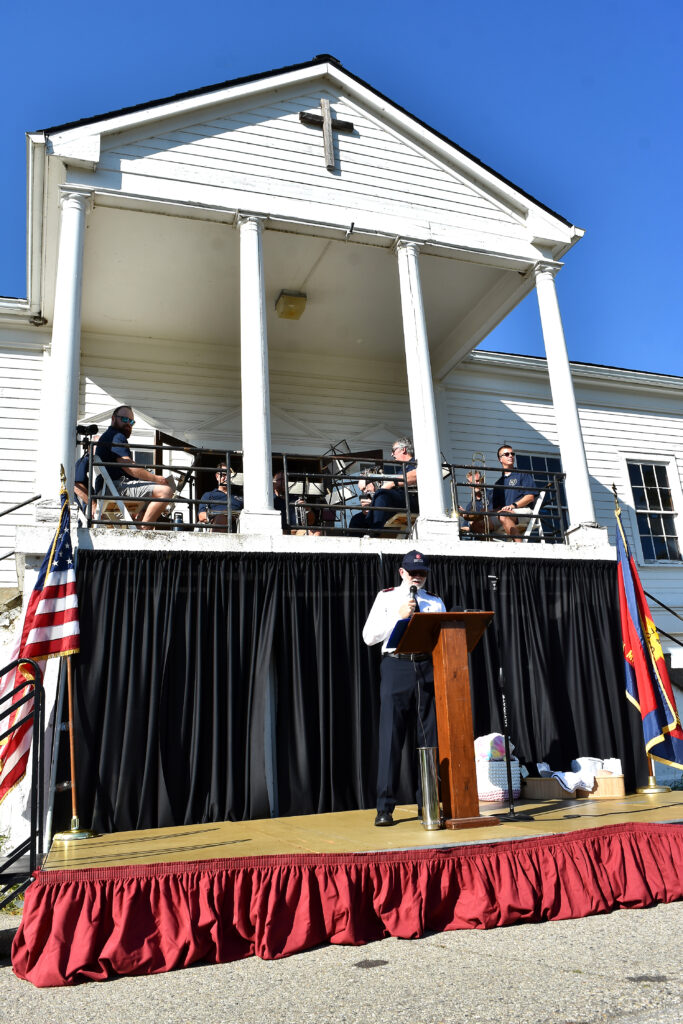
By James Hanlon
Leader Staff Writer
“It is impossible to know with certainty how many people have come through the gates of this camp,” Lt. Colonel John Turner told the crowd gathered on the northwest shore of Lakeville Lake. “Thousands, perhaps hundreds of thousands – 300,000 I have heard is the number. It’s impossible to know the impact this place has allowed to happen in the lives of those who have come here. Both have been immense, I am sure.”
A few hundred of those who have attended Echo Gove Camp and Retreat Center over the last century returned to its grounds in Leonard, Sept. 19, to celebrate its 100th birthday. The open house reunion featured favorite camp activities like pontooning, hayrides, crafts, and an opportunity for campers to swap memories over old photos.
“Beautifully set on the banks of Lakeville Lake, Echo Grove has been the place where young and old and everyone in between have enjoyed for 100 years making friends and learning more about music, camping, sports, swimming, boating and a host of other things, but nothing more important than learning more about Jesus Christ. That is at the very heart of what Echo Grove camp is all about,” said Turner, who is head of the Salvation Army’s Eastern Michigan Division.
Since 1921, the 200-acre camp has offered people from underserved communities a chance to experience the great outdoors and grow spiritually. “That’s the thing that is unchanged,” the camp’s director, Matt Coakley said, “is the ability to come out here and connect with nature, with God’s Kingdom.”
The camp was founded by Brigadier Samuel Withers, who was the division commander for the Salvation Army in Michigan. His wife was the camp’s first superintendent. “The old Chamberlin farm situated in Oakland county near the village of Lakeville is being transformed into a veritable paradise where many a tired mother can spend a few days for a recuperative recreation,” reported a June 25, 1921 article in the Monroe Evening News. “For the past five or six weeks a small army of carpenters have been putting up mess halls and dormitories and a fresh coat of snow-white paint is being applied now, while a troop of Salvation Army boy guards are burning trails and exterminating snakes and mosquitos.”
Brigadier Withers told the newspaper, “It will take years before we have the camp perfected in every detail, but we will have it in working order this summer. We are planning to take some poor mothers with their kiddies within a few weeks, and we will also remember the disabled soldiers with their families.”
Echo Grove was a great improvement over Camp Sunshine, located on Lake Huron, which had no permanent structures and no running water. Today, Echo Grove has 40 buildings housing 455 beds, and all the cabins have indoor plumbing.
Hills form a natural amphitheater around a grassy field (former wetlands that were filled in with gravel, in a failed attempt to build a beach) facing the lake. “If you stand anywhere up on those hills, you could just say something and people all over the camp could hear you,” said camp historian Angus MacKenzie, explaining how the camp got its name. MacKenzie first came to the camp from Detroit as an eight-year-old in 1946. He has returned as a camper, staff member or volunteer nearly every year since. He even wrote the history for the camp’s 50th anniversary.
When the pandemic hit last year, the camp saw a 95 percent reduction in use, Director Coakley said. So, he took his staff to fill in at soup kitchens and meal programs around metro Detroit that were short-staffed and prepared some 80,000 sandwiches over a couple months.
The camp is enjoyed year-round with churches, youth groups and business retreats using the facilities most weekends during off-summer months. Coakley said they are mostly booked through next spring.
At the anniversary, the camp also celebrated the groundbreaking of a new building: The Mervyn Price Chapel and Performing Arts Center. When construction is completed in about a year, it will seat about 600 people.
“It is the perfect size for us,” Coakley said. “It gives us the opportunity to open up rentals to outside groups with venue for them to have a bigger stage, meetings, maybe a performance, or maybe a large church wants to get away on a retreat. We can help accommodate them in a single space.”
The building is needed because the camp has long outgrown the old chapel, one of the camp’s oldest surviving buildings, from 1938. Coakley said the old chapel will have to come down eventually. “This building is important to a lot of people from a spiritual standpoint because it holds a lot of memories.”
A few other buildings did have to be removed to make room for the new chapel. “While we’re taking down some buildings, we’re not running from our past, we’re just progressing. We hold onto our past. It’s important to us,” he said.

Leave a Reply